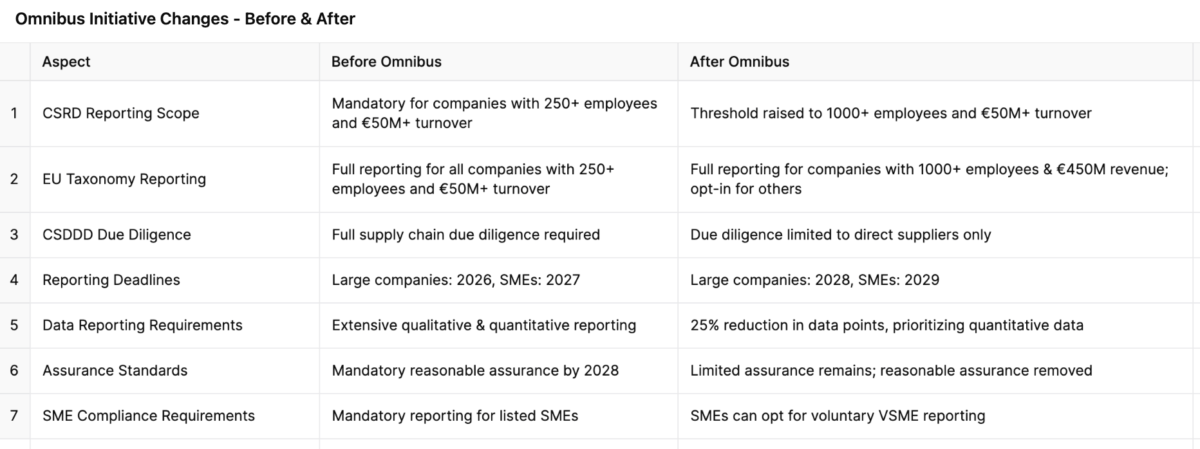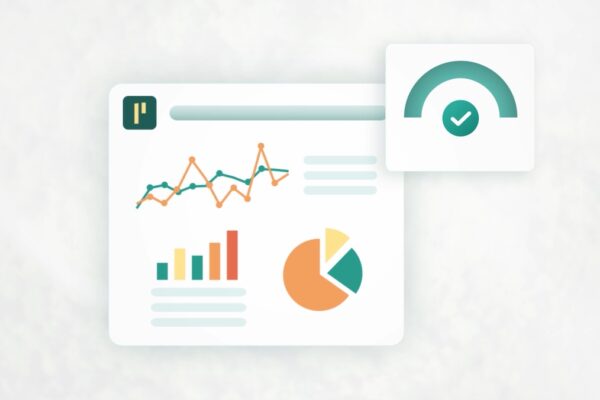Sustainability Reporting and Omnibus Initiative – What you Need to Know?
Sustainability Reporting after Omnibus
The EU Omnibus Proposal marks a significant shift in sustainability reporting, aiming to simplify compliance while maintaining transparency and competitiveness. This initiative will impact companies subject to CSRD (Corporate Sustainability Reporting Directive), CSDDD (Corporate Sustainability Due Diligence Directive), and EU Taxonomy regulations.
In this article, we’ll break down what the Omnibus Initiative means for businesses, key changes in sustainability reporting, and how companies can stay ahead of these evolving regulations without unnecessary disruptions to their reporting processes.
We encourage you to take a closer look at our CSRD reporting software. This AI-powered software ensures the latest directive is always implemented (latest directive with detailed instructions is implemented in the software), so you don’t have to worry about keeping up with regulatory changes. With real-time compliance tracking, AI shows your exact compliance percentage and guides you on what needs to be done next. Get started with a free pilot and forget about the constantly changing CSRD directives and make reporting easy!
What Is the Omnibus Proposal?
The Omnibus Initiative is a regulatory package introduced by the European Commission in February 2025 to reduce bureaucracy and simplify reporting obligations under sustainability regulations. It is part of a broader effort to balance climate goals with economic competitiveness, following the publication of the Competitiveness Compass for the EU.
Key elements of the Omnibus Proposal include:
- Merging and simplifying CSRD, CSDDD, and EU Taxonomy regulations.
- Reducing data reporting requirements to focus on essential metrics.
- Updating assurance requirements to streamline compliance.
- Introducing voluntary reporting for smaller companies.
For businesses, this means fewer compliance burdens and a stronger focus on quantitative over narrative data points. However, as regulations evolve, companies that have a structured, integrated approach to sustainability reporting will be best positioned to adapt with minimal effort.
Key Changes Under the Omnibus Initiative

1. CSRD Simplifications
The Omnibus Initiative introduces a phased approach to CSRD compliance, impacting businesses differently based on their size and structure:
- Large companies (1000+ employees, €50M+ turnover) will continue reporting but with simplified ESRS (European Sustainability Reporting Standards).
- SMEs and mid-sized companies (250-1000 employees) can opt for VSME (Voluntary SME Standards) instead of full CSRD compliance.
- Non-listed SMEs can choose voluntary sustainability reporting without the burden of full compliance.
These changes reduce the number of required data points by 25%, making reporting more manageable. But companies relying on manual processes or fragmented reporting tools will still struggle to keep up with future adjustments.
2. EU Taxonomy Adjustments
Companies with more than 1000 employees and over €450M revenue will continue full EU Taxonomy reporting. However, businesses with €50M-€450M in revenue will have access to a simplified framework on an opt-in basis.
Additionally:
- Operating expense (OpEx) reporting is required only if eligible activities exceed 25% of total revenue.
- Climate and Environmental reporting templates have been simplified, reducing reporting complexity by 70%.
For businesses managing multi-layered sustainability data, using an adaptive CSRD reporting system ensures compliance remains effortless, no matter how often the rules evolve.
3. CSDDD (Due Diligence) Changes
The Corporate Sustainability Due Diligence Directive (CSDDD) has been modified in several ways:
- Reduced supply chain due diligence – companies will focus only on direct suppliers instead of full supply chains.
- Civil liability provisions removed, reducing legal risks.
- Monitoring frequency reduced to every 5 years instead of more frequent reviews.
- Fines and penalties left to Member States, allowing flexibility in enforcement.
With due diligence requirements shifting, companies without a centralized compliance and ESG reporting system will find it increasingly difficult to track obligations across multiple regulatory frameworks.
4. “Stop-the-Clock” Proposal
One of the most impactful elements of the Omnibus Initiative is the postponement of sustainability reporting deadlines:
- Large companies’ CSRD reporting (originally 2026) is delayed to 2028.
- SME and financial institution reporting (originally 2027) is delayed to 2029.
- CSDDD compliance deadlines have been extended by a year.
These extensions offer businesses more time to adjust, but they also highlight the importance of using a system that centralizes compliance requirements—so that future changes do not disrupt operations or require a full-scale overhaul of reporting processes.
How Businesses Can Stay Ahead
The Omnibus Initiative is a clear sign that sustainability regulations will continue evolving. Companies that see reporting as a one-time compliance exercise may find themselves continuously scrambling to meet new requirements.
Organizations using an integrated CSRD reporting software like Planmark can seamlessly adapt to these changes, as the framework automatically incorporates evolving regulations and directives. Instead of struggling with each regulatory update, businesses can focus on strategic sustainability goals and competitive positioning.
Rather than treating CSRD and sustainability reporting as a compliance burden, forward-thinking companies use these frameworks as opportunities to enhance operational efficiency, improve investor relations, and strengthen brand trust.
Final Thoughts: The Omnibus Initiative as an Opportunity
While the Omnibus Initiative reduces regulatory complexity, businesses must still take a strategic approach to compliance. The shift toward simplified reporting and flexible compliance models allows companies to integrate sustainability into their strategies without unnecessary disruptions.
Those who invest in structured, adaptable reporting processes will benefit the most—not only in meeting compliance requirements but in building a future-proof ESG strategy that supports long-term growth.
Need Expert Guidance?
Navigating sustainability reporting doesn’t have to be overwhelming. With the right tools, you can turn compliance into a competitive advantage. Our team specializes in streamlining CSRD compliance and sustainability reporting—ensuring that regulatory changes never slow you down.
Get in touch today to make sustainability reporting effortless.


